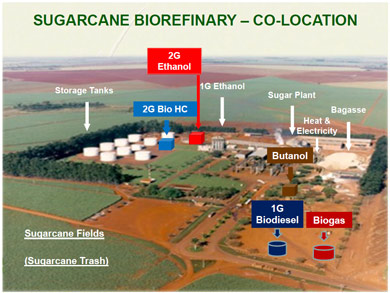Biofuels in South America and Central America
This page is currently being redeveloped, but some recent information and links on biofuels production in Brazil and Argentina is included below.
Biofuels in Brazil
Support for advanced biofuels in Brazil - presentation from EBTP SPM5 February 2013
Géraldine Kutas, Head of International Affairs, Unica

Updated information and statistics on biofuels in Brazil have been published in August 2012 the USDA GAIN Brazil Annual Biofuels Report 2012
Brazil is the world's second biggest producer of fuel ethanol (6921 million gallons in 2010 from sugar cane) and the world's biggest exporter of fuel ethanol. Ethanol blends are mandatory in Brazil (E20 to E25) and hydrous ethanol (E100) is also available from thousands of filling stations. There are 6 million flex-fuel vehicles in Brazil and 3 million able to run on E100. Ethanol accounts for 48 % (by volume) of 'light' transport fuels in Brazil. A 3% biodiesel blend is now also mandatory in Brazil and this was set to rise to B5 by 2013.
Advanced biofuels are also under development in Brazil. In April 2104 11 companies foounded the Brazilian Association of Industrial Biotechnology (ABBI), with a focus on biofuels and biochemicals. The ABBI will be based in Sao Paulo and founders include : GranBio, Raizen (joint venture between Cosan and Shell), CTC (Sugarcane Technology Center), DuPont, BASF, Solvay family (owner of Rhodia), Novozymes, DSM, Dow, BP and Kertex.
In Summer 2012, GraalBio Investimentos S.A. was due to start construction of the Brazil’s first commercial-scale cellulosic ethanol plant at Alagaos. The 22 MMgy plant will convert sugarcane straw and bagasse to feedstock using Prosea™ pretreatment technology licensed form Beta Renewables, a joint venture between Chemtex (Mossi & Ghisolfi Group) and TPG. Novozymes will supply the hydrolytic enzymes, and DSM yeasts will be used for the fermentation.
In July 2011 Amyris Brasil S.A., a subsidiary of Amyris, Inc., announced it will begin supplying up to 160 city buses in the Brazilian city of São Paulo with Amyris renewable diesel derived from sugarcane (Diesel de Cana™). Vehicle manufacturers in Brazil have issued warranties for the use of 10% Amyris renewable diesel blends in Brazil. The renewable diesel derived from plant-based sugars does not require engine or infrastructure modifications.
In April 2012, Solazyme announced a joint venture with Bunge (Solazyme Bunge Produtos Renovaveis Ltda.) to develop a commercial-scale (100,000 t.p.a.) oil production facility in Brazil, using Solazymes technology to convert sugar (from cane) to 'tailored oils'.
In January 2012, Abengoa announced that its cellulosic ethanol technology would be used to produce ethanol from sugar cane cane straw and bagasse, as part of the Industrial Innovation Program for the Sugar Energy Sector.
Petrobras has established a joint pilot plant with Universidade Federal do Rio Grande do Norte to produce biodiesel from microalgae in Extremoz.
Brazillian researchers are also looking at opportunities to develop aviation biofuels with Boeing Research & Technology-Brazil due to be established in 2012.
More up-to-date information is available in Biofuels Brazil, a weekly report with the latest facts, figures & market news
Sugar cane and sustainable biofuels
Sugar cane provides an energy balance of 8-10 (i.e. 8-10 times energy production in comparison to inputs) and GHG reduction of 90% (compared to only 30% for ethanol from corn, which offers an energy balance of only 1.5). The production of bioethanol is not viewed to have a major impact on world sugar prices (and sugar is not a staple food). Hence Brazil is considered by many organisations to be a sustainable biofuel producer.
See:
Sustainability of Brazilian Bioethanol (Report commissioned by SenterNovem)
UNICA - Brazilian Sugarcane Industry Association
UNICA sustainable sugar cane initiative
Brazilian Biofuels - Social Fuel Seal
Brazil and the Netherlands have signed a cooperation agreement on the sustainable production of biofuels. This will involve helping developing nations to establish sustainable biofuels crops.
Argentina biodiesel exports
In recent years Argentina has produced significant volumes of biodiesel, which were largely exported to Europe (1.15m tonnes in 2013). Following tariffs imposed by the EU in 2013 (on the basis that 'low-price' imports were damaging to European biodiesel producers), exports from Argentina were predicted to plunge by 39% in 2014 [Source: Argentina Biofuels Chamber (Carbio)].
Biofuels production in Columbia
See the FedeBiocombustibles for information and statistics on ethanol production and biodiesel production.
